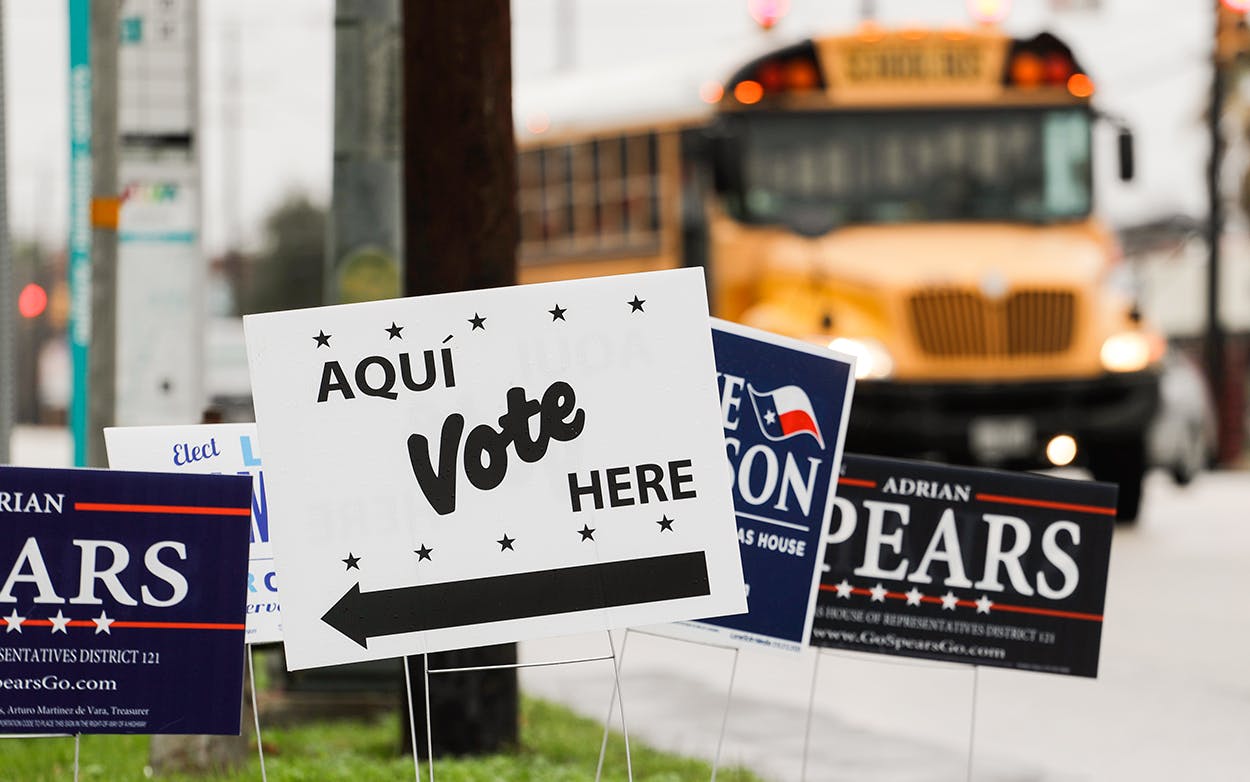An analysis of the first four days of early voting in the March 6 primaries indicates that the fabled rebellion against the Republican social conservative leadership may not be materializing. On the Democratic side, it shows a surge of new voters—a fifth of the primary turnout is from people with little to no history of voting in a Democratic primary.
The new analysis of the early voting turnout comes from Derek Ryan, a Republican consultant. Ryan builds off of a Texas Secretary of State database of who voted in which elections. The database does not tell anyone how you voted, but it does reveal the names of who votes in party primaries and general elections. He then receives a daily report from the election administrators in eighteen of the top Texas counties to compare current voters to past voters with an eye toward spotting trends.
What Ryan found on the Republican side is a usual primary for a non-presidential election year. So far, more than 86 percent of the Republican primary votes have been cast by people who voted in past Republican primaries. Only about seven percent of the vote has come from people who do not vote in party primaries. Crossover voting from Democrats is almost nonexistent, with only a single percent of the GOP vote coming from 2016 Democratic primary voters.
Business and education groups have been urging members to vote in the Republican primary because of opposition to issues like bathroom bills or private school vouchers. These initial numbers indicate a weak rebellion. At the same time, social conservatives regularly make up less than 42 percent of the Republican primary vote. If enough of the Republican regulars combine with the new voters, some upsets are possible, although right now they look unlikely.
Over on the Democratic side, almost eighteen percent of the voters are people with no history of voting in a primary of either party; another three percent are people with no history of voting at all in primary or general elections; and 1.5 percent were Republican primary voters in 2016. Without polling the individual voters, Ryan told me there is no way to tell whether the surge is from motivated general election Democrats or from “purple” voters prompted to vote Democrat because of anger over the national Republican party politics.
But there’s a twist in this story for the Democrats, and it doesn’t bode well for them. While the strong turnout may provide some hope of of a coming Blue Wave of Republican upsets, U.S. House Democratic minority leader Nancy Pelosi has a message for Texas Democrats: get it right with your primary vote or else don’t expect any help from us.
“How can I say this in a nice way? We have to be cold-blooded in what we do. In other words, if the wrong person wins—well nobody’s wrong—but if the person who can’t win, wins, it’s not a priority race for us anymore, because we’ve got 100 races,” Pelosi told the Austin-American-Statesman editorial board last week. “I hope for a wave, but I believe you make your wave. You make your wave.”
Pelosi said the Democratic Congressional Campaign Committee has five priority races in Texas for Congress, challenges to Republican incumbents Culberson of Houston; Will Hurd, holding a district that runs from San Antonio to El Paso; Pete Sessions of Dallas; John Carter of Round Rock; and the open seat that had been held by Lamar Smith of San Antonio.
The DCCC opposition research attack on Moser indicates the national party is not even going to wait for Texas voters to weigh in.
The contest for Congressional District 7 includes seven Democrats, with a runoff likely. Moser is in the top tier of contenders, along with nonprofit founder Alex Triantaphyllis and attorney Lizzie Pannill Flectcher, who has the backing of the national women’s political PAC Emily’s List. A DCCC memo on Moser said, “Democratic voters need to hear that Laura Moser is not going to change Washington. She is a Washington insider, who begrudgingly moved to Houston to run for Congress. In fact, she wrote in the Washingtonian magazine, ‘I’d rather have my teeth pulled out without anesthesia’ than live in Texas.” Moser actually specified Paris, Texas, not the state in general. Moser’s husband was a videographer for President Obama, and she was a freelance writer. The DCCC claimed she moved to Texas just to run for Congress.
Moser fired back: “We’re used to tough talk here in Texas, but it’s disappointing to hear it from Washington operatives trying to tell Texans what to do. These kind of tactics are why people hate politics. The days when party bosses picked the candidates in their smoke filled rooms are over. DC needs to let Houston vote.” She said Democrats need to concentrate on defeating Republicans, not each other. “We have a real chance to not only flip District 7, but bring some sanity back to Congress and resist the erratic extremism holding our White House hostage. It’s a lot to ask, and we can’t do any of it by throwing mud and tearing each other down. This is not the time to be a house divided.”
Ryan’s daily tracking of the early vote is available by email at: http://www.ryandata.com
512-320-6961
- More About:
- Politics & Policy






